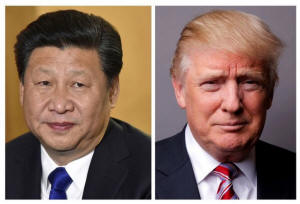|
'Don't use Taiwan', Taipei frets ahead of
Trump-Xi meeting
 Send a link to a friend
Send a link to a friend
 [March 20, 2017]
By J.R. Wu and Jess Macy Yu [March 20, 2017]
By J.R. Wu and Jess Macy Yu
TAIPEI (Reuters) - Taiwan's government,
worried about being used as a pawn by China and the United States, said
on Monday the self-ruled island must protect its own interests as
concerns in Taipei rise ahead of an expected meeting of U.S and Chinese
leaders.
China has never renounced the use of force to take back what it deems a
wayward province and has been pressuring Taiwan President Tsai Ing-wen,
who leads an independence-leaning ruling party, to concede Taiwan is a
part of China.
The United States is Taiwan's only major political ally and sole arms
supplier, and weapons sales to Taiwan have repeatedly upset Beijing.
"We call on the United States and China, when they improve relations, to
not use Taiwan in their own interest or as a chess piece," Catherine
Chang, Taiwan's minister in charge of China affairs, the Mainland
Affairs Council, told reporters.
Chang urged Beijing to communicate with Taipei "in order to maintain
stability and peace in the Asia Pacific region."
The comments come after U.S. Secretary of State Rex Tillerson told
Chinese President Xi Jinping on Sunday in Beijing that U.S. President
Donald Trump anticipates a meeting "soon."

At issue for Taipei is whether a Trump-Xi meeting will harm Taipei's
interests as Washington begins considering a big, new arms package for
Taiwan, a move sure to anger China.
In Beijing, Foreign Ministry spokeswoman Hua Chunying said China's
resolute opposition to U.S. arms sales to Taiwan was clear and
consistent.
"We hope the U.S. fully recognizes the high sensitivity and serious
harmfulness of U.S. arms sales to Taiwan," she told a daily news
briefing, adding that the United States should handle the Taiwan issue
cautiously.
There is contact between Taiwan and the new administration on the arms
sale issue, but a specific request list has not been drawn up for this
year, though there are pending requests from last year, defense ministry
official Wu Pao-kun told lawmakers.
"We should seek the greatest advantage in the interaction between the
United States and China, to reduce the possibility of Communist China
guiding and manipulating the U.S.-China-Taiwan relationship," said Peng
Sheng-chu, chief of Taiwan's National Security Bureau.
[to top of second column] |

A combination of file photos showing Chinese President Xi Jinping
(L) at London's Heathrow Airport, October 19, 2015 and U.S.
President Donald Trump posing for a photo in New York City, U.S.,
May 17, 2016. REUTERS/Toby Melville/Lucas Jackson/File Photos

Peng, who was answering questions at a parliamentary session, did
not elaborate on the steps Taiwan should take, but said the bureau's
current intelligence showed a new communique that could hurt
Taiwan's interests was unlikely to result from a Trump-Xi meeting.
"But we do not rule out the possibility," Peng added.
In December, Taiwan had celebrated a diplomatic coup when Trump, as
president-elect, took a congratulatory phone call from Tsai and
raised questions about whether he would stick with the
four-decade-old "one China" policy.
Trump changed tack last month, however, and agreed to honor the "one
China" policy during a phone call with Xi.
Tillerson left China with warm words from Xi on the weekend, ending
his first trip to Asia since taking office with an agreement to work
together with China on North Korea and putting aside trickier
issues.
Xi praised increasing communications in recent weeks between Beijing
and Washington, and said he was "confident" of seeing bilateral
relations move in the "right direction."
Taiwan was discussed during the meeting, but details were not
provided.
(Additional reporting by Ben Blanchard in Beijing; Editing by
Lincoln Feast)
[© 2017 Thomson Reuters. All rights
reserved.]
Copyright 2017 Reuters. All rights reserved. This material may not be published,
broadcast, rewritten or redistributed.
 |